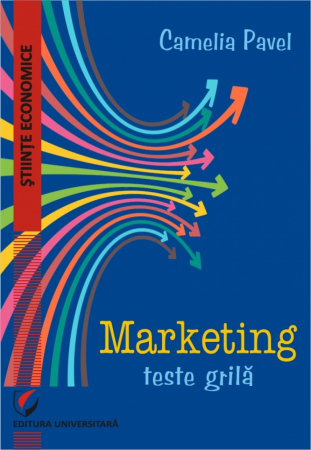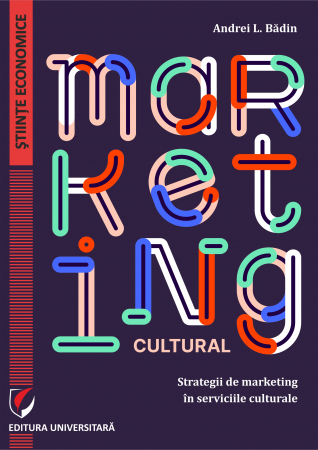Manuscript proposals: [email protected] / 0745 204 115 //// Tracking orders Individuals / Sales: 0745 200 357 / Orders Legal entities: 0721 722 783
Publisher: Editura Universitară
Author: Lavinia Dovleac
ISBN: 978-606-28-0647-7
DOI: 10.5682/9786062806477
Publisher year: 2017
Pages: 122
Product Code:
9786062806477
Do you need help?
0745 200 357
- Description
- Download (1)
- Authors
- Content
- More details
- Reviews (0)
"Be sensitive to change, be ready to transform."
Ph. D. Kotler
Along with marketing, innovation occupies an increasingly important place in every organization that wants to be competitive.
Innovation is a great challenge for any business, but it is also the driving force behind creating sustainable values. Innovation can be understood as a creative openness to exceptional ideas, as an activity of creating new products or improved products, and not in the end as a business strategy. An organization's innovations do not only influence it, but can shape the entire market - the needs of customers, the structure of participants, the channels that link them, the rules according to which it acts.
The current environment in which innovative organizations operate has a great influence on the way marketing activities are designed and carried out. The traditional approach is no longer effective because in many ways we can talk about a transition from the analog to the digital age of marketing. This new requirement is generated by the evolution of the traditional economy towards a digital economy.
The digital technology that characterizes the new economy contributes greatly to the assertion and development of the marketing concept of innovation. The emergence of virtual markets has been a strong shock felt by many companies. By accessing the internet, the penetration of traders on these markets is much easier due to the smaller number of entry barriers and the information is cheap and ubiquitous. In addition to digital technology, there are other factors that have an overwhelming effect on the modern economy: technology availability and its influence on the organization, technology life cycle, industry and product standards, industry infrastructure, product positioning and their credibility and organization. in front of consumers.
The evolution of the current technological environment has a strong influence on the development of marketing activities through product and process innovations that appear at a fast pace. Another aspect that has changed significantly is the attitude and behavior of consumers.
Access to information makes it more difficult for consumers to be satisfied because they are more aware of their needs. The consumers of the digital age are more different, more different from each other and more demanding. Their motivations and aspirations are complex and deciphering them requires a considerable effort on the part of marketing specialists. The digital revolution offers consumers advantages that consist in the availability of a very large volume of information both in the traditional format, but especially in the virtual environment, about a variety of topics, a greater variety of goods and services available, the opportunity to discuss with others consumers and to exchange opinions regarding products, services, companies, etc.
The defining characteristics of the complex process of production and marketing of innovative products require new approaches from the general perspective of marketing. The technology they incorporate both in their production process and in use, the risk involved due to the degree of novelty they have and the uncertainty related to the benefits they can offer customers, are elements that have led to the emergence of a new specializations of marketing, namely: innovation marketing.
This paper aims both to clarify the marketing concept of innovation approached as a distinct form of traditional marketing, and to address the elements associated with it.
Given the specific features of the current economic, social and technological context, we consider that innovation marketing is the current concept of business orientation, beneficial to the organization, individual or organizational consumers and society as a whole.
The Author
Ph. D. Kotler
Along with marketing, innovation occupies an increasingly important place in every organization that wants to be competitive.
Innovation is a great challenge for any business, but it is also the driving force behind creating sustainable values. Innovation can be understood as a creative openness to exceptional ideas, as an activity of creating new products or improved products, and not in the end as a business strategy. An organization's innovations do not only influence it, but can shape the entire market - the needs of customers, the structure of participants, the channels that link them, the rules according to which it acts.
The current environment in which innovative organizations operate has a great influence on the way marketing activities are designed and carried out. The traditional approach is no longer effective because in many ways we can talk about a transition from the analog to the digital age of marketing. This new requirement is generated by the evolution of the traditional economy towards a digital economy.
The digital technology that characterizes the new economy contributes greatly to the assertion and development of the marketing concept of innovation. The emergence of virtual markets has been a strong shock felt by many companies. By accessing the internet, the penetration of traders on these markets is much easier due to the smaller number of entry barriers and the information is cheap and ubiquitous. In addition to digital technology, there are other factors that have an overwhelming effect on the modern economy: technology availability and its influence on the organization, technology life cycle, industry and product standards, industry infrastructure, product positioning and their credibility and organization. in front of consumers.
The evolution of the current technological environment has a strong influence on the development of marketing activities through product and process innovations that appear at a fast pace. Another aspect that has changed significantly is the attitude and behavior of consumers.
Access to information makes it more difficult for consumers to be satisfied because they are more aware of their needs. The consumers of the digital age are more different, more different from each other and more demanding. Their motivations and aspirations are complex and deciphering them requires a considerable effort on the part of marketing specialists. The digital revolution offers consumers advantages that consist in the availability of a very large volume of information both in the traditional format, but especially in the virtual environment, about a variety of topics, a greater variety of goods and services available, the opportunity to discuss with others consumers and to exchange opinions regarding products, services, companies, etc.
The defining characteristics of the complex process of production and marketing of innovative products require new approaches from the general perspective of marketing. The technology they incorporate both in their production process and in use, the risk involved due to the degree of novelty they have and the uncertainty related to the benefits they can offer customers, are elements that have led to the emergence of a new specializations of marketing, namely: innovation marketing.
This paper aims both to clarify the marketing concept of innovation approached as a distinct form of traditional marketing, and to address the elements associated with it.
Given the specific features of the current economic, social and technological context, we consider that innovation marketing is the current concept of business orientation, beneficial to the organization, individual or organizational consumers and society as a whole.
The Author
-
MARKETINGUL INOVATIEI
Download
LAVINIA DOVLEAC
INTRODUCTION / 7
CHAPTER 1. MARKETING IN THE CONTEXT OF INNOVATION / 10
1.1. The marketing concept and its evolution / 10
1.2. New directions in the development of contemporary marketing / 13
1.3. The relationship between marketing and innovation in the digital age / 22
1.3.1. The role of innovations in contemporary society / 22
1.3.2. Sources of innovation and its typologies / 23
1.3.3. Marketing and failure in the innovation process / 27
CHAPTER 2. MARKETING INNOVATION - A NEW MARKETING SPECIALIZATION / 31
2.1. Defining aspects of innovation marketing / 31
2.2. Strategic tools of innovation marketing / 35
2.3. Market strategies in innovation marketing / 43
CHAPTER 3. INNOVATION CONSUMER BEHAVIOR / 50
3.1. General notions regarding consumer behavior / 50
3.2. Changes in consumer behavior in the digital age / 52
3.3. Ways to approach the generations of consumers of the digital age / 55
3.4. Adoption and dissemination of innovative products / 58
CHAPTER 4. MARKETING MIX FOR INNOVATIVE PRODUCTS / 67
4.1. Product policies and strategies in case of innovations / 67
4.1.1. Creation and development of innovative products / 67
4.1.2. Considerations on product policies in case of innovations / 73
4.1.3. Considerations regarding product strategies in case of innovations / 75
4.2. Policies and strategies regarding the prices of innovative products / 80
4.2.1. Factors influencing the formation of prices of innovative products / 80
4.2.2. Price policies for innovative products / 82
4.2.3. Pricing strategies for innovative products / 83
4.3. Policies and strategies regarding the promotion of innovative products / 86
4.3.1. Tools for promoting innovative products / 86
4.3.2. Communication channels in the case of innovative products / 88
4.3.3. Strategies for promoting innovative products / 93
4.4. Policies and strategies regarding the distribution of innovative products / 95
4.4.1. Innovative product distribution policies / 96
4.4.2. Distribution strategies for innovative products / 100
4.5. Policies and strategies regarding information assistance and support services for clients / 102
4.5.1. The need for a customer service and information support policy specific to innovations / 103
4.5.2. Types of information assistance and support services specific to innovations / 105
4.5.3. Information service and information support strategies for innovation-specific clients / 109
BIBLIOGRAPHY / 113
CHAPTER 1. MARKETING IN THE CONTEXT OF INNOVATION / 10
1.1. The marketing concept and its evolution / 10
1.2. New directions in the development of contemporary marketing / 13
1.3. The relationship between marketing and innovation in the digital age / 22
1.3.1. The role of innovations in contemporary society / 22
1.3.2. Sources of innovation and its typologies / 23
1.3.3. Marketing and failure in the innovation process / 27
CHAPTER 2. MARKETING INNOVATION - A NEW MARKETING SPECIALIZATION / 31
2.1. Defining aspects of innovation marketing / 31
2.2. Strategic tools of innovation marketing / 35
2.3. Market strategies in innovation marketing / 43
CHAPTER 3. INNOVATION CONSUMER BEHAVIOR / 50
3.1. General notions regarding consumer behavior / 50
3.2. Changes in consumer behavior in the digital age / 52
3.3. Ways to approach the generations of consumers of the digital age / 55
3.4. Adoption and dissemination of innovative products / 58
CHAPTER 4. MARKETING MIX FOR INNOVATIVE PRODUCTS / 67
4.1. Product policies and strategies in case of innovations / 67
4.1.1. Creation and development of innovative products / 67
4.1.2. Considerations on product policies in case of innovations / 73
4.1.3. Considerations regarding product strategies in case of innovations / 75
4.2. Policies and strategies regarding the prices of innovative products / 80
4.2.1. Factors influencing the formation of prices of innovative products / 80
4.2.2. Price policies for innovative products / 82
4.2.3. Pricing strategies for innovative products / 83
4.3. Policies and strategies regarding the promotion of innovative products / 86
4.3.1. Tools for promoting innovative products / 86
4.3.2. Communication channels in the case of innovative products / 88
4.3.3. Strategies for promoting innovative products / 93
4.4. Policies and strategies regarding the distribution of innovative products / 95
4.4.1. Innovative product distribution policies / 96
4.4.2. Distribution strategies for innovative products / 100
4.5. Policies and strategies regarding information assistance and support services for clients / 102
4.5.1. The need for a customer service and information support policy specific to innovations / 103
4.5.2. Types of information assistance and support services specific to innovations / 105
4.5.3. Information service and information support strategies for innovation-specific clients / 109
BIBLIOGRAPHY / 113
“Be sensitive to change, be ready to transform”
Ph.D. Kotler
Along with marketing, innovation occupies an increasingly important place in every organization that wants to be competitive. Innovation is a great challenge for any business, but it is also the driving force behind creating sustainable values. Innovation can be understood as a creative openness to exceptional ideas, as an activity of creating new products or improved products, and not in the end as a business strategy. An organization's innovations do not only influence it, but can shape the entire market - the needs of customers, the structure of participants, the channels that link them, the rules according to which it acts.
The current environment in which innovative organizations operate has a great influence on the way marketing activities are designed and carried out. The traditional approach is no longer effective because in many ways we can talk about a transition from the analog to the digital age of marketing. This new requirement is generated by the evolution of the traditional economy towards a digital economy.
The digital technology that characterizes the new economy contributes greatly to the assertion and development of the marketing concept of innovation. The emergence of virtual markets has been a strong shock felt by many companies. By accessing the internet, the penetration of traders on these markets is much easier due to the smaller number of entry barriers and the information is cheap and ubiquitous. In addition to digital technology, there are other factors that have an overwhelming effect on the modern economy: technology availability and its influence on the organization, technology life cycle, industry and product standards, industry infrastructure, product positioning and their credibility and organization. in front of consumers.
The evolution of the current technological environment has a strong influence on the development of marketing activities through product and process innovations that appear at a fast pace. Another aspect that has changed significantly is the attitude and behavior of consumers. Access to information makes it more difficult for consumers to be satisfied because they are more aware of their needs. The consumers of the digital age are more different, more different from each other and more demanding. Their motivations and aspirations are complex and deciphering them requires a considerable effort on the part of marketing specialists. The digital revolution offers consumers advantages that consist in the availability of a very large volume of information both in the traditional format, but especially in the virtual environment, about a variety of topics, a greater variety of goods and services available, the opportunity to discuss with others consumers and to exchange opinions regarding products, services, companies, etc.
The defining characteristics of the complex process of production and marketing of innovative products require new approaches from the general perspective of marketing. The technology they incorporate both in their production process and in use, the risk involved due to the degree of novelty they have and the uncertainty related to the benefits they can offer customers, are elements that have led to the emergence of a new specializations of marketing, namely: innovation marketing.
This paper aims both to clarify the marketing concept of innovation approached as a distinct form of traditional marketing, and to address the elements associated with it. The paper is structured in 4 chapters. The first chapter, entitled "Marketing from the perspective of innovation", briefly describes the evolution of marketing from its inception until now, highlighting the essential characteristics. It is important to create a balance between technological and marketing orientation to ensure organizations both the necessary competitive advantage and the opportunity to provide greater value to customers. Marketing has the task of creating the right context and infrastructure to ensure the success of innovations.
The second chapter, entitled "Innovation marketing - a new specialization of marketing" includes a characterization of this concept, focusing on the strategic component. Innovation marketing plays a dual role, in the sense that, on the one hand, it provides support to organizations in creating and developing innovative products that bring satisfaction to their users, and on the other hand, it supports consumers in accepting and adopting innovation and new technology.
A particularly important aspect that must be taken into account by innovation manufacturers is that it requires that all marketing activities be designed in an integrated vision and carried out throughout the development process of the new product: starting with the moments before substantiating the concept of new product and ending with the activities that manifest after the launch of the product in the market. The planning and realization of all marketing activities must be carried out by the organization taking into account the requirements of ethics and social responsibility, which in the case of innovations impose new requirements.
The third chapter entitled "Consumer behavior of innovations", aims to explain the complex purchasing behavior of the consumer of the digital age who is extremely involved in making the purchase and perceives significant differences between brands. The product in question is usually expensive, involves risks, is purchased less often and has a high degree of self-identification. Usually, the consumer must be informed in detail about the characteristic elements of the desired product. If there are elements of risk in the decision, they can become the target of influences from the immediate environment and the consumer can postpone the time of purchase to evaluate once again the alternatives or may decide not to buy.
The fourth chapter is dedicated to the marketing mix of innovations. By designing an effective marketing mix, innovative products and services are created, promoted and delivered that offer benefits to consumers, business partners and society in general. Given the current market context, the companies' innovative product policies and strategies have in mind the creation of new, quality products, highly customized through the services they accompany and the features they incorporate, designed to provide a pleasant and easy experience. during their use at prices corresponding to their value. Companies use multiple promotion strategies chosen depending on the products, the consumer segments they target and the channels through which they intend to communicate. Many companies exercise very strict control over the distribution of their products, often using their own distribution network or only certain types of distributors. The fifth element of the marketing mix, customer support and information services, aims not only to determine the sale of high-tech products, but also to develop a long-term relationship with the customer by advising him in the initial phase of the process. of decision and purchase, throughout the act of purchase and after its conclusion.
Innovative companies can find an optimal combination of the five components of the marketing mix so that, in increasingly complex and extremely dynamic markets, they can satisfy with their offer the demands of more and more informed and sophisticated consumers.
Given the specific features of the current economic, social and technological context, we consider that innovation marketing is the current concept of business orientation, beneficial to the organization, individual or organizational consumers and society as a whole.
Ph.D. Kotler
Along with marketing, innovation occupies an increasingly important place in every organization that wants to be competitive. Innovation is a great challenge for any business, but it is also the driving force behind creating sustainable values. Innovation can be understood as a creative openness to exceptional ideas, as an activity of creating new products or improved products, and not in the end as a business strategy. An organization's innovations do not only influence it, but can shape the entire market - the needs of customers, the structure of participants, the channels that link them, the rules according to which it acts.
The current environment in which innovative organizations operate has a great influence on the way marketing activities are designed and carried out. The traditional approach is no longer effective because in many ways we can talk about a transition from the analog to the digital age of marketing. This new requirement is generated by the evolution of the traditional economy towards a digital economy.
The digital technology that characterizes the new economy contributes greatly to the assertion and development of the marketing concept of innovation. The emergence of virtual markets has been a strong shock felt by many companies. By accessing the internet, the penetration of traders on these markets is much easier due to the smaller number of entry barriers and the information is cheap and ubiquitous. In addition to digital technology, there are other factors that have an overwhelming effect on the modern economy: technology availability and its influence on the organization, technology life cycle, industry and product standards, industry infrastructure, product positioning and their credibility and organization. in front of consumers.
The evolution of the current technological environment has a strong influence on the development of marketing activities through product and process innovations that appear at a fast pace. Another aspect that has changed significantly is the attitude and behavior of consumers. Access to information makes it more difficult for consumers to be satisfied because they are more aware of their needs. The consumers of the digital age are more different, more different from each other and more demanding. Their motivations and aspirations are complex and deciphering them requires a considerable effort on the part of marketing specialists. The digital revolution offers consumers advantages that consist in the availability of a very large volume of information both in the traditional format, but especially in the virtual environment, about a variety of topics, a greater variety of goods and services available, the opportunity to discuss with others consumers and to exchange opinions regarding products, services, companies, etc.
The defining characteristics of the complex process of production and marketing of innovative products require new approaches from the general perspective of marketing. The technology they incorporate both in their production process and in use, the risk involved due to the degree of novelty they have and the uncertainty related to the benefits they can offer customers, are elements that have led to the emergence of a new specializations of marketing, namely: innovation marketing.
This paper aims both to clarify the marketing concept of innovation approached as a distinct form of traditional marketing, and to address the elements associated with it. The paper is structured in 4 chapters. The first chapter, entitled "Marketing from the perspective of innovation", briefly describes the evolution of marketing from its inception until now, highlighting the essential characteristics. It is important to create a balance between technological and marketing orientation to ensure organizations both the necessary competitive advantage and the opportunity to provide greater value to customers. Marketing has the task of creating the right context and infrastructure to ensure the success of innovations.
The second chapter, entitled "Innovation marketing - a new specialization of marketing" includes a characterization of this concept, focusing on the strategic component. Innovation marketing plays a dual role, in the sense that, on the one hand, it provides support to organizations in creating and developing innovative products that bring satisfaction to their users, and on the other hand, it supports consumers in accepting and adopting innovation and new technology.
A particularly important aspect that must be taken into account by innovation manufacturers is that it requires that all marketing activities be designed in an integrated vision and carried out throughout the development process of the new product: starting with the moments before substantiating the concept of new product and ending with the activities that manifest after the launch of the product in the market. The planning and realization of all marketing activities must be carried out by the organization taking into account the requirements of ethics and social responsibility, which in the case of innovations impose new requirements.
The third chapter entitled "Consumer behavior of innovations", aims to explain the complex purchasing behavior of the consumer of the digital age who is extremely involved in making the purchase and perceives significant differences between brands. The product in question is usually expensive, involves risks, is purchased less often and has a high degree of self-identification. Usually, the consumer must be informed in detail about the characteristic elements of the desired product. If there are elements of risk in the decision, they can become the target of influences from the immediate environment and the consumer can postpone the time of purchase to evaluate once again the alternatives or may decide not to buy.
The fourth chapter is dedicated to the marketing mix of innovations. By designing an effective marketing mix, innovative products and services are created, promoted and delivered that offer benefits to consumers, business partners and society in general. Given the current market context, the companies' innovative product policies and strategies have in mind the creation of new, quality products, highly customized through the services they accompany and the features they incorporate, designed to provide a pleasant and easy experience. during their use at prices corresponding to their value. Companies use multiple promotion strategies chosen depending on the products, the consumer segments they target and the channels through which they intend to communicate. Many companies exercise very strict control over the distribution of their products, often using their own distribution network or only certain types of distributors. The fifth element of the marketing mix, customer support and information services, aims not only to determine the sale of high-tech products, but also to develop a long-term relationship with the customer by advising him in the initial phase of the process. of decision and purchase, throughout the act of purchase and after its conclusion.
Innovative companies can find an optimal combination of the five components of the marketing mix so that, in increasingly complex and extremely dynamic markets, they can satisfy with their offer the demands of more and more informed and sophisticated consumers.
Given the specific features of the current economic, social and technological context, we consider that innovation marketing is the current concept of business orientation, beneficial to the organization, individual or organizational consumers and society as a whole.
If you want to express your opinion about this product you can add a review.
write a review

6359.png)
![Innovation marketing [1] Innovation marketing [1]](https://gomagcdn.ro/domains/editurauniversitara.ro/files/product/large/marketingul-inovatiei-379-984906.jpg)














